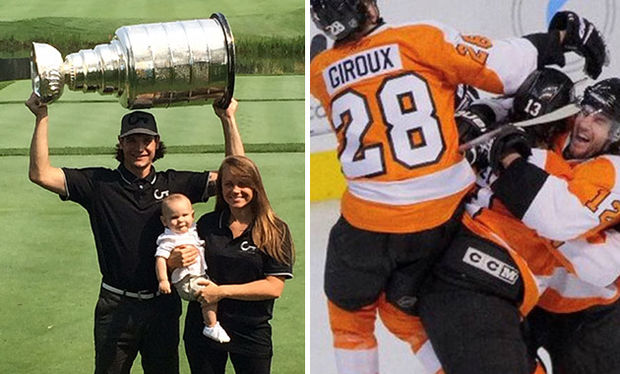Daniel Carcillo on Brain Injuries in Sports
Featured Traumatic brain injury advocate and Stanley Cup champion, Daniel Carcillo, shares his experiences with concussions and mental health in professional sports.

Mediaplanet spoke with traumatic brain injury (TBI) advocate and Stanley Cup champion Daniel Carcillo about his experiences with concussions and mental health in professional sports.
What inspired you to start raising awareness for traumatic brain injuries and mental health?
Daniel Carcillo: There were two things: the death of my best friend, Steve Montador, in Feb. 2015 and my seventh-diagnosed concussion in the NHL in March of that same year. These incidents prompted me to make a video with The Players Tribune, calling for change and a more serious look at how we understand, diagnose, and care for traumatic brain injuries.
What is the Chapter 5 Foundation?
The Chapter 5 Foundation is, at its core, a transition program. We help former athletes' transition into life after the game and we help people navigate through the big stressors we encounter during transition from having a brain injury to healing and dealing with it. For hockey players specifically, that includes assessing one's mental and physical state, self-discovery work into who are you away from the game, information about health insurance, helpful tips for family members and loved ones on how to recognize signs of mental health complications, and ultimately, helping men and women repurpose their life after sport.
"Take a breath, do the research, put in the work, and keep your spirits positive."
With transition, the first thing that must be looked at is someone's health, including brain health and the correct care options for a number of ailments. Chapter 5 stands for the next chapter in someone's life and 5 stands for Steve's number.
What does the future have in store for the Chapter 5 Foundation?
We are currently planning a spring fundraiser both in Chicago and in Toronto. Look for more information on our website and on my social media outlets.
Tell us about your experiences with TBI and concussions in professional sports.
My experiences with TBI and concussions in the NHL, though they have not been positive, have brought me to a point where today I can speak honestly and with vulnerability about my experience in an effort to help others recognize signs and symptoms and to help them move into proper understanding, diagnosis, and care. In my opinion, the ImPACT test that is used at the professional level needs to be one of the mechanisms used to acquire a concussion baseline — it shouldn't be the only tool used.
Do you feel empowered as a patient?
I feel empowered to freely give away the information that I have been given, although it has come at a cost as alternative treatments are expensive. People need to know that an MRI or CT scan cannot show or diagnose a concussion.
What treatments have you found to be the most effective?
In my experience, proper diagnosis comes through the eyes and checking the five systems — autonomic, cognitive, vestibular, ocular, and affect — for concussion.
Once that's completed, a Carrick Institute-trained functional neurologist can make you a personalized program — not to treat the person with a condition but to treat the condition in the person. Each case is individualized. Functional neurology and Drs. Ted Carrick and Matt Antonucci have saved my life in my two separate treatments and visits.
What's the connection between TBIs and mental health?
Left undiagnosed and treated, TBIs can lead to mental health complications that someone may not be prepared to handle because they may not have been predisposed to mental health issues before. 90% of all concussions heal themselves while the other 10% are known as the outliers or post-concussive syndrome patients. I fell into the 10% and was experiencing mental health issues like anxiety, depression, and suicidal ideation. When I left them untreated, they got worse but once I went for treatment, they subsided. Not completely, mind you, but I now know how to manage them.
What are you doing to optimize and maintain your brain health?
"I have a toolbox full of care options that I utilize on a daily basis."
I have a toolbox full of care options that I utilize on a daily basis. For example, if I wake up on a bad day and I'm feeling my anxiety or depression, I assess what's going on through meditation, deep belly breathing, hydrating, and exercising. I'm a music lover, so putting on some music and working in the yard or writing is really helpful. I also keep up with my daily vision exercises and do a functional neurology visit once a year. Things like reflexology, acupuncture, craniosacral therapy, and chiropractic medicine are tools I use on a weekly basis to stay healthy.
What advice would you give to someone with a TBI or a concussion?
Sit out for 24 to 48 hours if you have a suspected brain injury or concussion and monitor your symptoms. Seek the help of a medical professional. If you're experiencing signs and symptoms for longer than a month, you need to seek out care options from a functional neurologist.
Stay hopeful. Just because you've had multiple brain injuries doesn't mean you are destined to die from chronic traumatic encephalopathy (CTE). Take a breath, do the research, put in the work, and keep your spirits up. I'm living proof that the quality of life that post-concussion syndrome steals from you does not have to rob you of your peace.
